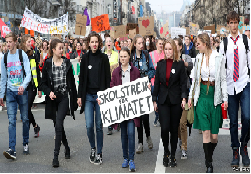March 2019 Culture and Society
Read the articles selected in March 2019
Human rights mean nothing, unless we defend real, threatened people
By Kenan Malik
Source: The Observer, 10 March
When an individual is stripped of his appartenence to a political community he loses every right. The human rights are not the unalienable baggage of a person, but always are the term of a dispute and a collective achievement, since when they are denied, every other right is left behind.
Pour l’Europe: renverser la table
By Jacques Attali
Source: L’Express, 6 March
Given the growth of its international competitors, Europe has no way but to join its own forces in order to build common projects, also through an antitrust reform. For this reason, the European elections are more important than the rather sane diffidence into the democracy of the European system.
L’Europe ou la croissance épuisée
By Jean-Marc Vittori
Source: Les Echos, 12 March
In a complex and fragile economic context, with a growth under 2 %, Italy at risk of recession, and an intermittent technological progress, the failed ascent of the Old Continent seems to be a problem of a lack of strategic coordination and vision.
What are at school climate strikes?
Fonte: The Economist, 14 March

The movement of the teens for the climate has become global. The common instances of the world’s students are matched with more specifical demands, that claim the right of citizenship of these minors in the Planet which we adults will leave to them.
Style
By Margot Guicheteau
Source: Le Figaro, 7 February

Barbie, the doll created to not to be cradled, has let generations of girls dream of a life distant from the domestic fireplace. Her perfect body has been blamed for perpetuating sexist models among the girls. But more than a sexual object, Barbie wants to be an icon of style.
La lengua inclusiva, entre le política y la gramática
By Jesus Ruiz Mantilla
Source: El País, 28 January
The linguistic reform of the Spanish Constitution is a political issue, and not a grammatical one. From a political point of view, to not nominate means to deny, and hence to duplicate a subject in male and female is not against the economy of the language.
Female workers at Walmart sue retailer over gender bias
By Michael Sainato
Source: the Guardian, 19 February
The largest class action ever brought against an employer in the US history concerns Walmart, the world’s largest retailer, and is founded on the sexual discrimination suffered by 1.5 million female workers in the form of denial of equal pay and career opportunities.
How young women are changing the rules of poetry
Source: The Observer, 27 January
A democratic tool like the web can be used as an instrument of poetic expression. Once outside of the exclusive academic circles, mostly directed by men, the rules change and the objects of poetry too. A femininity no more told with the male words appears in a light which sends a precise political message.
“2040” paints an optimistic picture of the future of the environment
Source: The Economist, 19 February

“There must be room for a different story”. From the worst scenarios of climate change this documentary presented at the Berlinale raises hope in the show of all the possibilities we have to make the world better and our planet the best place where to live in.
Read more:
Steinbeck, des migrantes et des doutes
By Philippe Lançon
Source: Libération, 28 February
Life is always drafted in our work. “Jour de travail” is the daily diary by John Steinbeck, which documents the difficulties and the moods of the author in the long five months spent in the writing of the “Raisins de colère”, the epic romance about a family of inmigrant farmers from Oklahoma.
L’émergence de “L’histoire des Blancs”
By Sonya Faure
Source: Libération, 25 February
The flourishing of the “Whiteness Studies” shows that the racial issue is not a problem locked in our libraries. If it is no longer a scientific or ideological question, it is always a problem of power, and hence it is still a social, linguistic and aesthetic one.
Sexy and sacred Artists speak across centuries in show that’s mysterious and almost modern
By Adrian Searle
Source: The Guardian, 1 March
At the Royal Academy in London, a show of Renaissance naked borrowed from all Europe and the United States, represents what the human body can tell, from the horrific to the erotic, but that once immortalized by the painting has always something sacred.
Info
- Pubblicato il : 01/04/2019 Modificato il : 04/04/2019
Allegati
- What are the school climate strikes pdf
- L'Europe ou la croissance épuisée pdf
- Pour l'Europe pdf
- Human rights mean nothing pdf
- How young women are changing the rules of poetry pdf
- Female workers at Walmart pdf
- La lengua inclusiva pdf
- Style pdf
- Sexy and sacred pdf
- "L'histoire des Blancs" pdf
- Steinbeck, des migrantes et des doutes pdf

